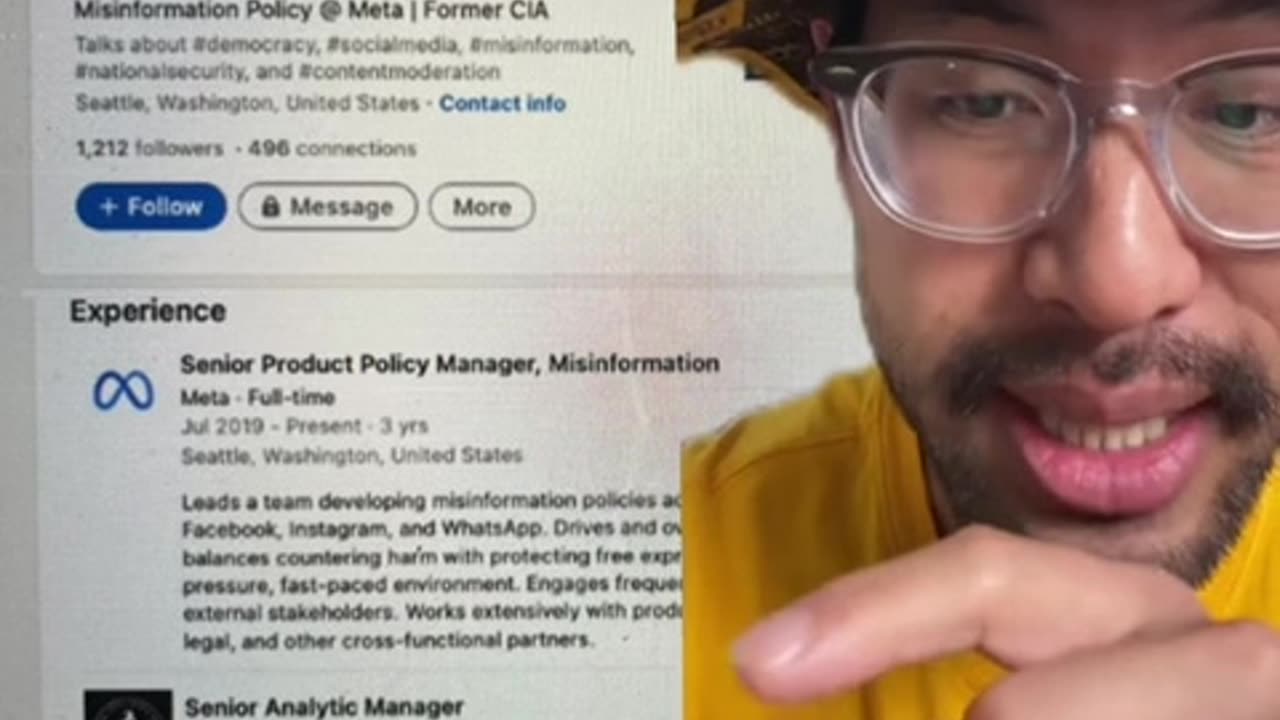Premium Only Content

The Deep State of Digital Control: Unmasking the CIA’s Influence Over Meta
When we think of Meta, formerly Facebook, we often associate it with its public figurehead, Mark Zuckerberg. However, beneath the surface lies a far more complex and concealed power structure, one that stretches into the very heart of the U.S. intelligence apparatus—specifically the CIA. This theory delves into the idea that Meta, much like other tech giants, is not just a corporation catering to social connectivity but rather a tool in a much larger, covert intelligence operation aimed at controlling information, shaping global narratives, and subtly manipulating public opinion.
1. Operation Mockingbird 2.0: The Digital Age
Operation Mockingbird, a Cold War-era CIA program, used mainstream journalists to disseminate U.S. government propaganda in the media. What started as a means of influencing foreign nations has, according to conspiracy theorists, evolved into something far more insidious in the digital age. With declining trust in traditional media, social media platforms like Meta have become the new battleground for controlling information and narrative-building.
Just as Mockingbird utilized news outlets, today’s CIA allegedly embeds its influence directly into the frameworks of social media companies. Key figures like Aaron Berman, Deborah B., Cameron Harris, and Hagen Barnett, all with deep ties to the CIA, now serve in crucial policy-making positions at Meta. These individuals are responsible for crafting the content moderation and misinformation policies that determine what users can and cannot say on the platform.
Supporting Evidence:
• Multiple Meta executives have CIA backgrounds, making the platform’s upper echelon resemble a covert intelligence agency more than a traditional tech firm.
• The same methods used in Mockingbird—controlling narratives, curating content, and manipulating public perception—are evident today but are applied with greater precision through algorithms, AI, and massive user data.
2. Digital Surveillance and Meta’s Massive Data Collection
Meta has access to an unprecedented level of data on billions of users worldwide, covering personal connections, behavior patterns, interests, political leanings, and more. Through the lens of this theory, this vast data is seen as the new battleground for psychological manipulation and mass surveillance.
The CIA, through its operatives at Meta, allegedly uses this data to run sophisticated psychological operations (PSYOPS), influencing political opinions, destabilizing governments, and silencing dissent. This would explain why certain viewpoints, particularly those critical of powerful Western governments or their allies, often find themselves labeled as “misinformation” or “dangerous.”
Historical Context:
• Meta’s history of cooperation with government agencies dates back to its inception, with platforms like Facebook working with law enforcement and intelligence agencies in surveillance capacities. Leaked documents (like those from Edward Snowden) revealed how social media is often used as a surveillance tool under PRISM, a program run by the NSA.
• The Cambridge Analytica scandal, which exposed how Facebook data was harvested for political manipulation, serves as a precedent for how platforms can be weaponized for control.
3. Meta as a Tool for Global Social Engineering
The CIA’s influence within Meta goes beyond simply controlling information—it also includes social engineering on a global scale. By shaping the algorithms that decide what content gets seen and by whom, the intelligence community can amplify certain narratives and bury others. This allows them to drive global conversations on issues such as war, economics, and political ideology.
For example, during key moments in global politics—such as elections, civil unrest, or international crises—Meta’s platform can be used to steer the public towards certain “acceptable” viewpoints. This aligns perfectly with the goals of intelligence agencies seeking to preserve global power structures and geopolitical dominance.
Supporting Evidence:
• In times of political turmoil, Meta has been known to adjust its algorithms, reportedly to reduce the spread of misinformation. But it’s often unclear what constitutes “misinformation,” and critics argue that these adjustments frequently suppress dissenting voices or alternative perspectives.
• This type of control would mirror traditional CIA operations to destabilize governments or control foreign populations by manipulating media narratives, just updated for the digital age.
4. Meta, TikTok, Google, and the Web of Influence
Meta is not alone in its alleged connection to the CIA. Other major tech platforms like Google and TikTok are also believed to be part of this broader operation. By controlling multiple channels of communication, the intelligence community can maintain a tighter grip on global narratives.
TikTok, often perceived as a platform driven by Chinese interests, is believed by some conspiracy theorists to be another layer in the intelligence game—either as a counterbalance to U.S. control over platforms like Meta, or as a covert player working in tandem with American interests through shared backdoor agreements.
Historical Context and Evidence:
• Google’s involvement in surveillance through PRISM, and its deep relationships with military and intelligence contracts, point to a larger ecosystem where multiple platforms are influenced by government agencies.
• Despite being rivals in the corporate world, platforms like Meta and Google are alleged to share similar goals when it comes to controlling information and data for purposes far beyond commercial profit—serving the interests of powerful global actors instead.
5. Shaping the Future of Reality: Meta and the Metaverse
As Meta shifts toward creating the “Metaverse,” this new reality could provide even more control over how people interact, think, and experience the world. In this speculative future, the Metaverse could become the ultimate tool for manipulating reality, blurring the lines between the virtual and the real, all under the watchful eyes of embedded intelligence agencies.
Within the Metaverse, the CIA and other agencies could deploy psychological conditioning techniques, using virtual experiences to mold perceptions and behaviors in ways that were previously unimaginable. If platforms like Meta serve as the gatekeepers to this new digital frontier, the potential for control and manipulation becomes exponentially greater.
Theoretical Evidence:
• The integration of AI, virtual reality, and augmented reality into everyday life presents new avenues for social control. When combined with massive data collection and content moderation policies already in place, these technologies could be harnessed to subtly shape public consciousness.
Conclusion: Meta’s Role in the New Digital Cold War
Meta, under the surface of its innocuous branding as a “social network,” may very well be the new face of digital intelligence operations, continuing the legacy of Operation Mockingbird in the digital age. With former CIA personnel in key policy-making positions and its vast control over global information flows, Meta serves as a powerful tool in the hands of the intelligence community. Whether through narrative control, surveillance, or the construction of the Metaverse, Meta is positioned at the forefront of a covert global power structure that uses digital platforms to shape reality itself.
In this evolving landscape, the next phase of human experience may be dictated not by elected governments or visible leaders, but by the unseen forces that have, for decades, sought to control the very fabric of information, perception, and consciousness.
-
 1:29
1:29
FragmentsOfTruth
2 days agoDecoding the Symbols: The Number 13, Masonic Orders, and Illuminati Secrets
141 -
 1:02:45
1:02:45
Tundra Tactical
13 hours ago $30.48 earned🛑 KASH PATEL NEW ATF DIRECTOR??? Breaking News!!!! 🛑
94.8K15 -
 4:31:10
4:31:10
I_Came_With_Fire_Podcast
23 hours agoMy EURO Divorce | HOGG with a side of PAC | Foreign FUNDS Fudged
59.4K9 -
 37:44
37:44
Glenn Greenwald
19 hours agoGlenn On Tearing Down the Military Industrial Complex, Exposing Pro-Israel Indoctrination, and More | SYSTEM UPDATE #411
138K205 -
 4:04:20
4:04:20
Nerdrotic
19 hours ago $57.17 earnedAmazon Takes 007! Hollywood is Lost, Disney Cancels WHO? | Friday Night Tights 342 /w ItsAGundam
196K58 -
 43:27
43:27
Tucker Carlson
18 hours agoRay Dalio: America’s Hidden Civil War, and the Race to Beat China in Tech, Economics, and Academia
213K224 -
 56:56
56:56
Candace Show Podcast
18 hours agoEXCLUSIVE: Taylor Swift Will Be Deposed. | Candace Ep 150
248K204 -
 1:03:52
1:03:52
IsaacButterfield
15 hours ago $10.86 earnedRepublican Vs 25 Transgender Activists | Jewish Outrage | Lizzo Loses All the Weight
86.4K27 -
 1:10:23
1:10:23
Edge of Wonder
19 hours agoChinese Biochips Hacking Minds? Quantum Control & Journey Song Mandela Effect
101K9 -
 2:15:46
2:15:46
Quite Frankly
22 hours ago"Ghosts, Robotics, and OBE's" ft. Dr. Albert Taylor 2/21/25
90.1K19